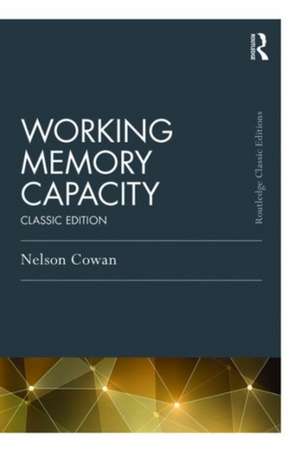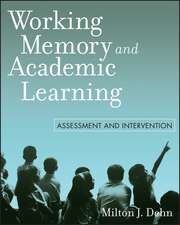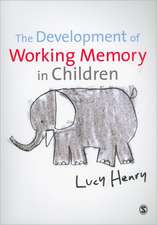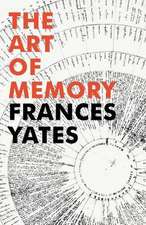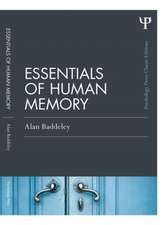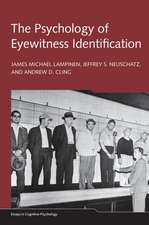Working Memory Capacity: Classic Edition: Psychology Press & Routledge Classic Editions
Autor Nelson Cowanen Limba Engleză Paperback – 20 apr 2016
This groundbreaking book explains the evidence supporting Cowan's theoretical proposal about working memory capacity, and compares it to competing perspectives. Cognitive psychologists profoundly disagree on how working memory is limited: whether by the number of units that can be retained (and, if so, what kind of units and how many), the types of interfering material, the time that has elapsed, some combination of these mechanisms, or none of them. The book assesses these hypotheses and examines explanations of why capacity limits occur, including vivid biological, cognitive, and evolutionary accounts. The book concludes with a discussion of the practical importance of capacity limits in daily life.
This 10th anniversary Classic Edition will continue to be accessible to a wide range of readers and serve as an invaluable reference for all memory researchers.
| Toate formatele și edițiile | Preț | Express |
|---|---|---|
| Paperback (2) | 233.06 lei 6-8 săpt. | |
| Taylor & Francis – 9 iun 2014 | 233.06 lei 6-8 săpt. | |
| Taylor & Francis – 20 apr 2016 | 411.76 lei 6-8 săpt. | |
| Hardback (2) | 514.03 lei 6-8 săpt. | |
| Taylor & Francis – 16 sep 2005 | 514.03 lei 6-8 săpt. | |
| Taylor & Francis – 12 apr 2016 | 1109.99 lei 6-8 săpt. |
Din seria Psychology Press & Routledge Classic Editions
-
 Preț: 387.27 lei
Preț: 387.27 lei -
 Preț: 340.65 lei
Preț: 340.65 lei -
 Preț: 340.14 lei
Preț: 340.14 lei -
 Preț: 356.64 lei
Preț: 356.64 lei -
 Preț: 310.56 lei
Preț: 310.56 lei -
 Preț: 327.83 lei
Preț: 327.83 lei - 8%
 Preț: 383.44 lei
Preț: 383.44 lei -
 Preț: 310.95 lei
Preț: 310.95 lei -
 Preț: 375.99 lei
Preț: 375.99 lei -
 Preț: 302.94 lei
Preț: 302.94 lei - 8%
 Preț: 473.76 lei
Preț: 473.76 lei -
 Preț: 447.51 lei
Preț: 447.51 lei -
 Preț: 440.38 lei
Preț: 440.38 lei - 8%
 Preț: 418.46 lei
Preț: 418.46 lei -
 Preț: 447.72 lei
Preț: 447.72 lei -
 Preț: 370.28 lei
Preț: 370.28 lei -
 Preț: 487.96 lei
Preț: 487.96 lei - 15%
 Preț: 689.28 lei
Preț: 689.28 lei -
 Preț: 496.01 lei
Preț: 496.01 lei -
 Preț: 468.36 lei
Preț: 468.36 lei - 26%
 Preț: 817.87 lei
Preț: 817.87 lei - 5%
 Preț: 449.45 lei
Preț: 449.45 lei -
 Preț: 440.21 lei
Preț: 440.21 lei -
 Preț: 500.46 lei
Preț: 500.46 lei - 18%
 Preț: 1005.80 lei
Preț: 1005.80 lei -
 Preț: 471.25 lei
Preț: 471.25 lei - 25%
 Preț: 993.44 lei
Preț: 993.44 lei -
 Preț: 489.26 lei
Preț: 489.26 lei -
 Preț: 451.97 lei
Preț: 451.97 lei - 18%
 Preț: 1279.65 lei
Preț: 1279.65 lei
Preț: 411.76 lei
Nou
Puncte Express: 618
Preț estimativ în valută:
78.79€ • 82.56$ • 65.13£
78.79€ • 82.56$ • 65.13£
Carte tipărită la comandă
Livrare economică 11-25 aprilie
Preluare comenzi: 021 569.72.76
Specificații
ISBN-13: 9781138913370
ISBN-10: 1138913375
Pagini: 238
Dimensiuni: 152 x 229 x 22 mm
Greutate: 0.35 kg
Ediția:Classic ed.
Editura: Taylor & Francis
Colecția Routledge
Seria Psychology Press & Routledge Classic Editions
Locul publicării:Oxford, United Kingdom
ISBN-10: 1138913375
Pagini: 238
Dimensiuni: 152 x 229 x 22 mm
Greutate: 0.35 kg
Ediția:Classic ed.
Editura: Taylor & Francis
Colecția Routledge
Seria Psychology Press & Routledge Classic Editions
Locul publicării:Oxford, United Kingdom
Cuprins
Preface. The Problem of Capacity Limits. The Processing System as a Context to Examine Capacity. Refinement of the Concept of Working Memory Capacity. Capacity Limits and the Measurement of Chunking. Further Evidence of a Constant Capacity. Other Views of Capacity Limits. Why the Capacity Limit?.
Notă biografică
Nelson Cowan is Professor of Psychology at the University of Missouri. His research specializations include short-term or working memory, childhood development of short-term and working memory, and the relationship between working memory and selective attention. Nelson is the Director of the Working-Memory Laboratory and co-editor of The Development of Memory in Infancy and Childhood.
Descriere
This groundbreaking book explains Cowan's theoretical proposal about working memory capacity, and compares it to competing perspectives. The book assesses memory hypotheses and examines explanations of why capacity limits occur, and concludes with a discussion of the practical importance of capacity limits in daily life.
Recenzii
"This is an excellent and timely manuscript that I would expect to be widely read by cognitive psychologists with an interest in working memory and attention. It addresses a classic issue, namely the question of whether short-term memory has a limited capacity...presents a clear and balanced view of the field..." -- Alan Baddeley, University of York
"This is an excellent book, bringing a wealth of knowledge to bear to make the case for a daring hypothesis that will have a large impact on the study of working memory and our understanding of human cognitive abilities." -- Klaus Oberauer, University of Bristol
"Cowan demonstrates a scholarly mastery of his subject and includes a broad range of evidence from other fields." -- Victor Colotla, in PsycCRITIQUES August 2006
"This is an excellent book, bringing a wealth of knowledge to bear to make the case for a daring hypothesis that will have a large impact on the study of working memory and our understanding of human cognitive abilities." -- Klaus Oberauer, University of Bristol
"Cowan demonstrates a scholarly mastery of his subject and includes a broad range of evidence from other fields." -- Victor Colotla, in PsycCRITIQUES August 2006
